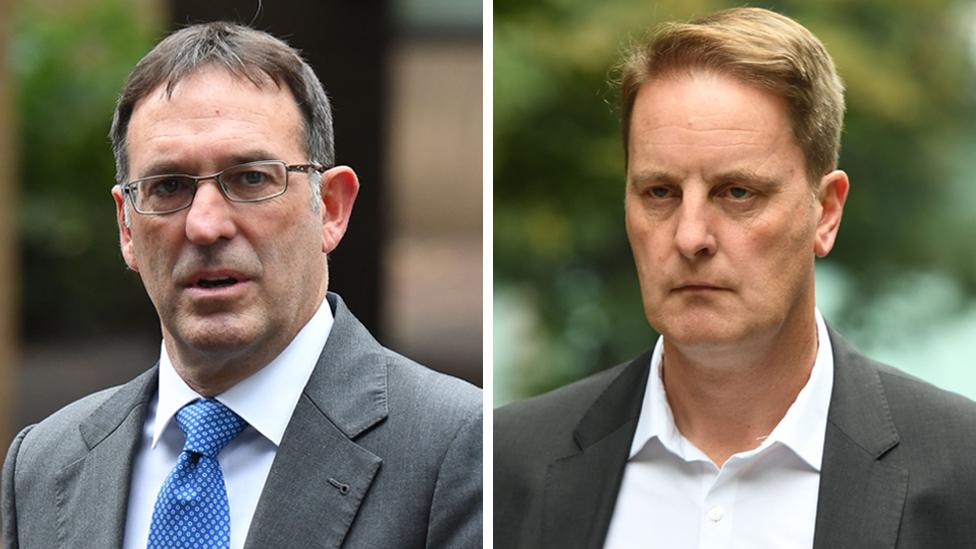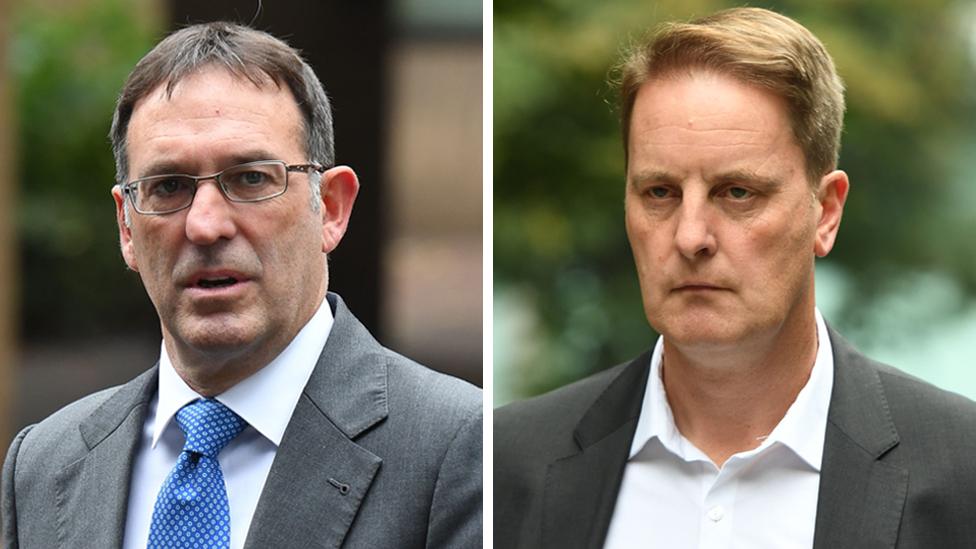'I should never have been charged' - former Tesco director
- Published
Former Tesco director Carl Rogberg says there was "never any evidence" of wrongdoing against him
A former director of Tesco has said he should never have been charged after being acquitted of fraud at the supermarket chain.
Carl Rogberg also questioned why Tesco had agreed two years ago to a fine for overstating its profits in 2014.
On Wednesday he was acquitted of the charges, which date back to 2014.
He is the last of three former directors who had been charged to be acquitted, in a blow to the Serious Fraud Office.
Last month, a judge, Sir John Royce dismissed cases against Chris Bush and John Scouler, saying "in certain crucial areas the prosecution case was so weak it should not be left for a jury's consideration".
The investigation was sparked by an announcement by Tesco in September 2014 that its profits were overstated by £250m.
'Serious questions'
Mr Rogberg said: "It's a huge relief that this day has finally come. While I always had faith that it would, the journey here has not been an easy one. The trial has had enormous consequences on my health and exemplary career, as well as for my wife, my son, my family and my friends."
He had not been well enough to stand trail with his former colleagues, after he suffered heart-attack during the first trial.
After Wednesday's developments in Southwark Crown Court, Mr Rogberg said he had "serious questions" for the SFO and Tesco about the way the case had been handled.
"In short, there was never any evidence of my wrong-doing and I should never have been charged," he said.

Chris Bush (left) and John Scouler (right) have already been acquitted
In the trial of Mr Bush and Mr Scouler, the SFO had described them as "generals".
It claimed "foot-soldiers" working below them were "pressurised and coerced" into wrongly booking income to hit targets and make the Tesco look healthier than it was.
Tesco agreed to a deferred prosecution agreement (DPA) with the SFO in 2014 and the £129m fine.

Analysis: Justice abandoned?
By Jonty Bloom, business correspondent
At first sight it seems like an impossible contradiction. A huge company admits its accounts have been fiddled and avoids prosecution and pays a fine of £129m through a deferred prosecution agreement; yet when three of its top executives are prosecuted for faking the accounts the judge throws out the case for lack of evidence.
But while a company might admit guilt and even pay a large fine that doesn't necessarily mean an individual working for that company is guilty. For instance it may well be in the interests of the firm to avoid a long, costly and embarrassing trial; quickly draw a line under a crisis and concentrate on putting the company back on its feet. In this case, Tesco stresses that the DPA was approved by a High Court judge as being in the public interest.
However, Mr Rogberg said today: "Truth and justice were abandoned for their (Tesco's) commercial imperatives."
The collapse of this case exposes a question of common justice. The deferred prosecution agreement that Tesco signed when it paid that huge fine named the three defendants as the guilty men, directly contradicting the not guilty verdicts. An outcome that one of the men's lawyers described as "an unfair and extraordinary outcome".

Mr Rogberg said Tesco had rushed its investigation and, by agreeing to the fine, had damaged employees, shareholders and pension funds which invest in the company's shares.
'Interests of justice'
"Truth and justice were abandoned for their commercial imperatives," he said.
Tesco defended the DPA - a type of a punishment without a conviction - saying it had been "separately approved by a senior High Court judge as being in the interests of justice".
The supermarket said the overstatement of its profits in September 2014 had been "independently investigated and verified by [accountants] Deloitte".
Since then, Tesco said it had introduced a new model for buying and selling products, changed its management and had stronger relationships with suppliers.
'Unprecedented'
Mr Rogberg also criticised the SFO for making errors and described the case as a "dreadful waste of taxpayers' money".
Tesco paid £3m in costs for the DPA but the other costs of the case have not yet been published.
Mr Rogberg's lawyer, Neil O'May, partner at Norton Rose Fulbright, said this situation was significant as it was an acquittal that occurred as a result of insufficient evidence rather an acquittal by a jury.
"It is a finding that there was insufficient evidence on which the case could have been brought. This is unprecedented in high profile serious fraud cases," Mr O'May said.
The SFO published the DPA, external for the first time, in which it sets out three members of Tesco's "senior leadership team" - Mr Bush, Mr Rogberg and Mr Scouler - who "were aware of and dishonestly perpetuated" the misstatement of the accounts for a six month period.
Mr O'May said the DPA "was plainly wrong as it was based on the assumption of guilt of Carl Rogberg and his colleagues".
"Its release now, after it has been shown to be false, remains deeply prejudicial and distressing to Mr Rogberg," he said
'Great pressure'
The DPA reveals why the SFO thought the three defendants had a case to answer but the trial judge found that there was not even enough evidence to put before the jury.
Lisa Osofsky, director of the SFO, said Tesco "dishonestly created a false account of its financial position by overstating its profits".
"The DPA clearly outlines the extent of this criminal conduct for which the company has accepted full responsibility."
According to the DPA, Tesco expected its employees to meet financial targets when they were set which "gave rise to a culture in which... employees were under great pressure to deliver in line with the budget". It states that between 1 February 2014 and 18 September 2014 employees misstated commercial income by £257m.
Ms Osofsky has been the head of the SFO since August.
- Published28 March 2017

- Published6 December 2018
